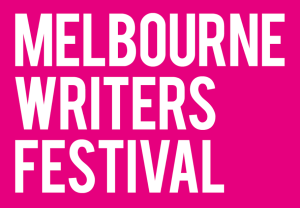 With the Melbourne Writers Festival now mere hours behind us, I’d like to have a brief reflection on the various sessions I attended. Being the bleeding heart that I am, my interest lay more in the political sessions, rather than the industry-oriented ones. Unfortunately I missed our erstwhile ex-opposition leader Mark Latham’s display, but there was much else on over the ten day festival to entertain and inform. I attended six events across the course of the festival.
With the Melbourne Writers Festival now mere hours behind us, I’d like to have a brief reflection on the various sessions I attended. Being the bleeding heart that I am, my interest lay more in the political sessions, rather than the industry-oriented ones. Unfortunately I missed our erstwhile ex-opposition leader Mark Latham’s display, but there was much else on over the ten day festival to entertain and inform. I attended six events across the course of the festival.
Author Archives: Cecilia Quirk
That’s Not the Mushroom Hedgefund People Living off the Strawberry
Ticonderoga Publications, RRP $29.99
August 2015
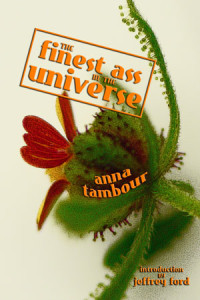 The Finest Ass in the Universe is a collection of 26 wacky and frequently hilarious stories. Striding through such diverse topics as microbial pathogens and ancient tailors; special parrots and defeating counterfeiters, the tales are fast-paced and entertaining. The collection is global in scale and spread throughout history. The only unifying theme to the pieces seems to be the infinite, unexpected possibilities of the universe–though there are also a lot of tales revolving around food and digestion. Continue reading
The Finest Ass in the Universe is a collection of 26 wacky and frequently hilarious stories. Striding through such diverse topics as microbial pathogens and ancient tailors; special parrots and defeating counterfeiters, the tales are fast-paced and entertaining. The collection is global in scale and spread throughout history. The only unifying theme to the pieces seems to be the infinite, unexpected possibilities of the universe–though there are also a lot of tales revolving around food and digestion. Continue reading
On the Banners, Visions of the Future
Gollancz, RRP $22.99
June 2015
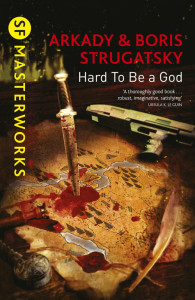 Olena Bormaschenko’s translation of Arkady and Boris Strugatsky’s Hard to Be a God represents the second translation of the Russian sci-fi classic into English. As much is discussed in the forward to the book, by Ken MacLeod, who admits to an abortive first attempt to read the novel back in 1977. Admittedly not a reader of much sci-fi myself*, I had never heard of Hard to Be a God before receiving it for review. I am certainly glad for the new translation, if MacLeod’s criticisms are accurate. Bormaschenko’s edition is a clear and easily readable one. Indeed, in terms of translation my only quibble is with the use of rather twee insults and phrases at times. However, since the book was written in the 1960s, this is likely an accurate reflection of how it reads in Russian.
Olena Bormaschenko’s translation of Arkady and Boris Strugatsky’s Hard to Be a God represents the second translation of the Russian sci-fi classic into English. As much is discussed in the forward to the book, by Ken MacLeod, who admits to an abortive first attempt to read the novel back in 1977. Admittedly not a reader of much sci-fi myself*, I had never heard of Hard to Be a God before receiving it for review. I am certainly glad for the new translation, if MacLeod’s criticisms are accurate. Bormaschenko’s edition is a clear and easily readable one. Indeed, in terms of translation my only quibble is with the use of rather twee insults and phrases at times. However, since the book was written in the 1960s, this is likely an accurate reflection of how it reads in Russian.
Hard to Be a God is the rather Star Trekish tale of a future earth man living undercover as an observer on a planet and in a feudal kingdom. Because of the similarities of this planet’s feudal culture to Earth’s European middle ages, Anton and several other historians are there to note social development and… stuff. Unfortunately, what Anton sees unfolding does not follow the progression his historical studies have prepared him for. Instead, he finds the unmistakeable signs of fascism emerging.
Nothing, Nothing will Keep Us Together
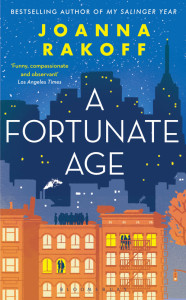 A FORTUNATE AGE
A FORTUNATE AGE
Joanna Rakoff
Bloomsbury, July 2015, RRP $32.99
I took up A Fortunate Age under considerable misapprehension as to the time period in which it is set. Somehow missing both the details in the blurb and the first line, which literally features the word “1998″*, I launched into it believing it was about my generation. I am 26 right now and was interested to “see what an author some twenty years my senior thought about it all. Would it involve angering stereotypes? Would I find it self-deprecatingly humorous? Despite very quickly correcting the flaws in my understanding, and after fighting a bout of cynicism about reading a book about 20-somethings in the late 90s, I decided to persevere. And admittedly, I expected to hate this book. I didn’t.
On the face of it, Joanna Rakoff’s novel about coming of age is not something I would have chosen to read. It is contemporary fiction, a genre I generally dislike, and once the immediate connection with myself had gone**, I expected I would despise the characters in all their trust-funded, New York whininess. Yet something in Rakoff’s confiding, urgent tone, which reminded me a little of 19th century novelists, kept me going. Though I found most of the characters irritating and some themes and elements troubling, I enjoyed A Fortunate Age. I enjoyed it rather a lot.
He Makes Milton Friedman Look Middle-of-the-Road.
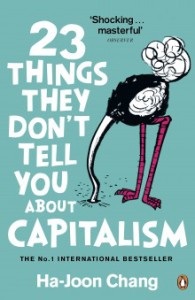 23 THINGS THEY DON’T TELL YOU ABOUT CAPITALISM
23 THINGS THEY DON’T TELL YOU ABOUT CAPITALISM
Ha-Joon Chang
First published 2010
Ah, capitalism. Can’t live with it; can’t live without it. Whether you’re a free marketeer or dreaming of a communist future, at least capitalism’s ubiquity is something we can all agree on. And whatever your stance on market control, there are probably things you don’t know about capitalism and its various orthodoxies. Even I, who expected to receive little more than confirmation of things I knew or at least suspected*, was surprised by some of the content of Ha-Joon Chang’s popular economics book.
They Live in You
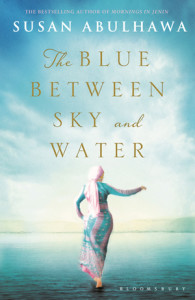 THE BLUE BETWEEN SKY AND WATER
THE BLUE BETWEEN SKY AND WATER
Susan Abulhawa
Bloomsbury, June 2015, RRP $29.99
The Blue Between Sky and Water is one of those rare novels that takes devastating themes and events, but fills them all with a sense of hope. Set in Palestine during and after the Naqba, up until the mid-2010s, the novel could very easily have been many things. While its bias is obvious*, Abulhawa avoids diatribe and sentimentality in building her story of a family and a country torn apart.
And Wish that I Had a Mother
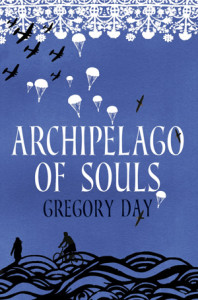 ARCHIPELAGO OF SOULS
ARCHIPELAGO OF SOULS
Gregory Day
Picador, June 2015, RRP $32.99
Archipelago of Souls appealed to me at first glance. Its main character, Wesley Cress, arrives as a soldier settler on King Island and provides an instant link to my own family history. My father and his brothers and sisters grew up for the most part on King Island after my grandfather took land there as a soldier settler himself. Though the book is set probably 15 years or so before my family arrived there, I couldn’t help wondering if the (in)famous Kelly Quirk might make an appearance somehow. That’s the power of half-remembered family legend, I suppose.
When I was 18 or so, we took a family trip to King Island to look at the old farm, which had been sold on to another family some decades again. We went in June or July, for peak wind effect, and spent a few days in family reunion. I never met my grandfather. I’ve heard some of his ludicrous stories, tales about his … let’s call them “adventures” on the island and his youth, of his alcoholism and his time during the war. My dad and my grandma, Na, also died when I was five and 14 respectively; and on the island I felt very connected with them despite their absense. So the cold trip on the isolated island remains a powerful memory. King Island is part of the family mythology.
Is There a Place Where You are Sacred? Is There a Place where You Can Run?
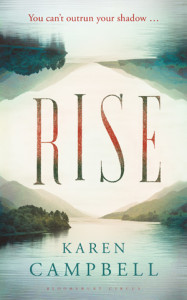 RISE
RISE
Karen Campbell
Bloomsbury Circus, May 2015, RRP $32.99
Rise is a small piece in the history of Scotland’s many and various failed nationalist efforts since 1707. Having concluded that rosy-cheeked young pretenders make poor generals, and that kilts and chest-thumping are best left to post-football pub brawls (or race riots), the modern independence-minded Scot has turned to the plebiscite as a method of experimentation*. Those of you familiar with Scottish history will probably see that this step is a bit dull, but for the best.
Despite misgivings about the author’s surname “Campbell”**, but moreso about the unlikelihood that I would enjoy this book, since I don’t generally enjoy contemporary fiction, I decided to give Rise a go. More interested in the political themes than the plot itself, I’m glad I did. However, though it is well-written and genuinely gripping, I was sadly correct in my initial assumption that the novel was not for me.
To Let Our Country Live
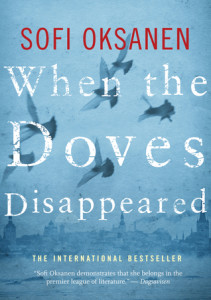 WHEN THE DOVES DISAPPEARED
WHEN THE DOVES DISAPPEARED
Sofi Oksanen, translated by Lola M. Rogers
Atlantic Books, May 2015, RRP $27.99
When the Doves Disappeared is a thoughtful glimpse into Estonian life during occupation by Nazi Germany, and the subsequent USSR rule. It is a study in the meaning of political conviction; passion; loyalty; and love, amongst many other things. Estonian-Finnish poet Sofi Oksanen’s second novel, it is both espionage thriller and literary reflection, with a gripping plot, elegant language, and carefully crafted, deeply flawed characters.
The Magi Can Go Home Too, Everyone Can Go Home
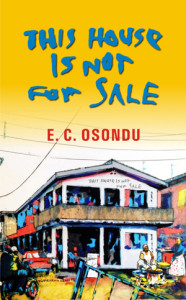 THIS HOUSE IS NOT FOR SALE
THIS HOUSE IS NOT FOR SALE
E.C. Osondu
Granta, June 2015, RRP $29.99
E.C. Osondu second story collection, This House is Not For Sale is a collection of short stories surrounding the residents of the Family House. It is a slim volume that packs a punch, provoking thoughts about the nature of truth and story. Characters and events take on a mythic quality as they are related by the unnamed, unidentified narrator.
Loud and Dreadful Sound, which Sky and Ocean Smote
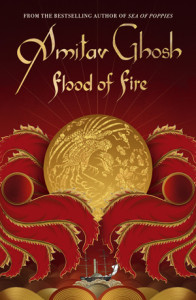 FLOOD OF FIRE
FLOOD OF FIRE
Amitav Ghosh
John Murray, May 2015, RRP $29.99; eBook RRP $16.99
Flood of Fire is the final book in Amitav Ghosh’s Ibis trilogy and concerns the first Opium War, the eventual Chinese defeat, and the seizure of Hong Kong by English forces. Sorry, um, spoilers I guess? It introduces some further new characters in Kesri Singh, the brother of Deeti, Bahram Modi’s widow Shireen, and Neel’s son Raju. We also catch up again with Zachary Reid, who’s had a bad time of it since last we saw him, after taking the fall for events at the end of Sea of Poppies.
A Painted Ship upon a Painted Ocean
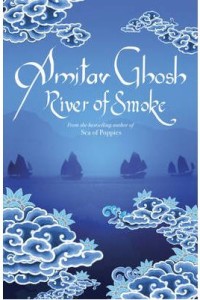 RIVER OF SMOKE
RIVER OF SMOKE
Amitav Ghosh
John Murray, June 2011, RRP $27.95
The second in Amitav Ghosh’s Ibis trilogy, River of Smoke first takes up some 40 or 50 years after the events of Sea of Poppies, to reveal the ultimate fate of several of the characters. Since the end of the last book left things up in the air*, this choice threw me a bit when I started it. Perhaps I have a tendency to become complacent when reading certain things, so am particularly confused when shown an unexpected curve ball. I wondered if, perhaps, this second book took place entirely at this juncture. Fortunately for my state of mind, the novel does quickly return to the 1830s and the continuing development of the first Opium War.

